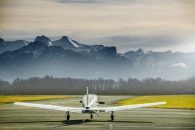Aviation insurance is as vital as any other type of insurance for business owners and individuals who fly. It is crucial to have a good understanding of what aviation insurance covers before signing up for a policy. Let’s look at a few details regarding aviation insurance.
What Does Aviation Insurance Cover?
Here are some of the essential things that aviation insurance covers:
- Aircraft hull damage: It protects your aircraft if it is damaged in a crash or any other type of accident.
- Liability: It covers third-party bodily injury or property damage that might occur as a result of the operation of your aircraft.
How Much Does Aviation Insurance Cost?
The cost of aviation insurance depends on a few factors, such as the type of aircraft, its age, named pilot qualifications, and the amount of coverage you need.
Typically, insurance for a standard single-engine land aircraft, with a qualified pilot, insurance can cost between $300-$2,000 a year for liability only coverage. For complex aircraft, including turbo-props, multi-engine and seaplanes, the cost can be as high as $5,000 for a liability only policy.
When shopping for aviation insurance, it is essential to work with your broker and compare quotes from different carriers. Quotes will vary not just on price, but also may have different pilot training requirements, deductibles and policy coverages.
One of the base coverages on an aviation insurance policy is liability coverage, which is typically offered at $1,000,000 total liability, limited to $100,000 per passenger. This fits with most airport requirements of $1,000,000 in premises liability coverage, provided by the aircraft insurance policy.
How Do You Choose an Aviation Insurance Company?
Just like with any other type of insurance, it is essential to do your research before choosing an aviation insurance company. Here are a few factors to consider when shopping for an insurer:
- Financial stability: Make sure to choose a company that is financially stable and has a good rating with credit agencies.
- Claims history: A company with a good track record of paying out claims is more likely to give you the coverage you need.
- Customer service: Choose a company that has good customer service and is easy to work with.
- Discounts: Some companies offer discounts for things like taking a safety course or having a good flying record.
Do You Still Need Aviation Insurance If You’re Flying a Non-Owned Plan?
Let’s say you rent an aircraft or plan to get one from a friend for vacation. Would you still need to get aviation insurance?
In such a case, you’d need renters or non-owned insurance as a secondary coverage to protect yourself. An Aircraft renters insurance policy, also called a non-owned insurance policy, can provide both liability coverage and physical damage coverage for the aircraft itself, up to a certain value.
Often, people think that the aviation insurance purchased by the aircraft’s owner will cover them in the event of an accident or incident however if there is a lapse or gap in coverage or the insurer denies the claim, non-owned aircraft insurance is always a great secondary coverage to have.
Therefore, the following people should have non-owned aviation insurance:
- Student pilots
- People who rent or borrow aircraft
- Someone delivering a plane for someone else
- Anyone flying the aircraft, even if they’re accompanied by the plane’s actual pilot or owner
How to Lower Your Aviation Insurance Rates?
Aviation insurance is meant to protect you financially in case something goes wrong. However, that doesn’t mean that you have to overpay for it.
Here are a few tips to help you get the most affordable aviation insurance rates:
- Find a broker you trust: Aviation insurance is a specialty market with a lot of different options and intricacies to consider. The best thing you can do to ensure you get the most competitive rates and coverages is to find an aviation insurance broker that you trust and let them shop the market for you.
- Improve your flying record: If you have a good flying record, you’re less of a risk, and therefore, you may be eligible for a discount.
- Take a safety course: Many companies offer a discount to pilots who have taken a safety course or who are AOPA members.
Weather elements can cause significant wear and tear to an aircraft. Therefore, you should hangar your aircraft during bad weather to prevent any damage.
While arranging a hangar can be costly, it can save you money in the long run by preventing wear and tear. Plus, it may help lower your insurance premiums.
It’s also important to regularly inspect your aircraft to make sure that everything is in working order. Doing so can help you spot any potential problems before they cause significant damage.
Why choose BWI Aviation Insurance?
Over our 42 year history, BWI has built longstanding relationships with all of the above Aviation Insurance Companies. We work hand in hand with the above companies and leverage our experience to find the best market for your particular airplane insurance risk.
To ensure that you are getting the absolute lowest rate and best coverage with a rock solid A+ rated Aviation Insurance company, get a quote with BWI today. We specialize only in Airplane Insurance and our office is open 12 hours a day. Our agents are friendly and knowledgeable, and most importantly they are agents that you can trust to get you the best coverage for your needs. Aviation Insurance is all that we do and have done for 42 years.
Call 800.666.4359 today for a free Airplane Insurance Quote or Click Here to submit a quote request online.
BWI is the Nation’s Leader in Aviation Insurance, with offices based in Corona, CA and Anchorage, AK.
Continue Reading



